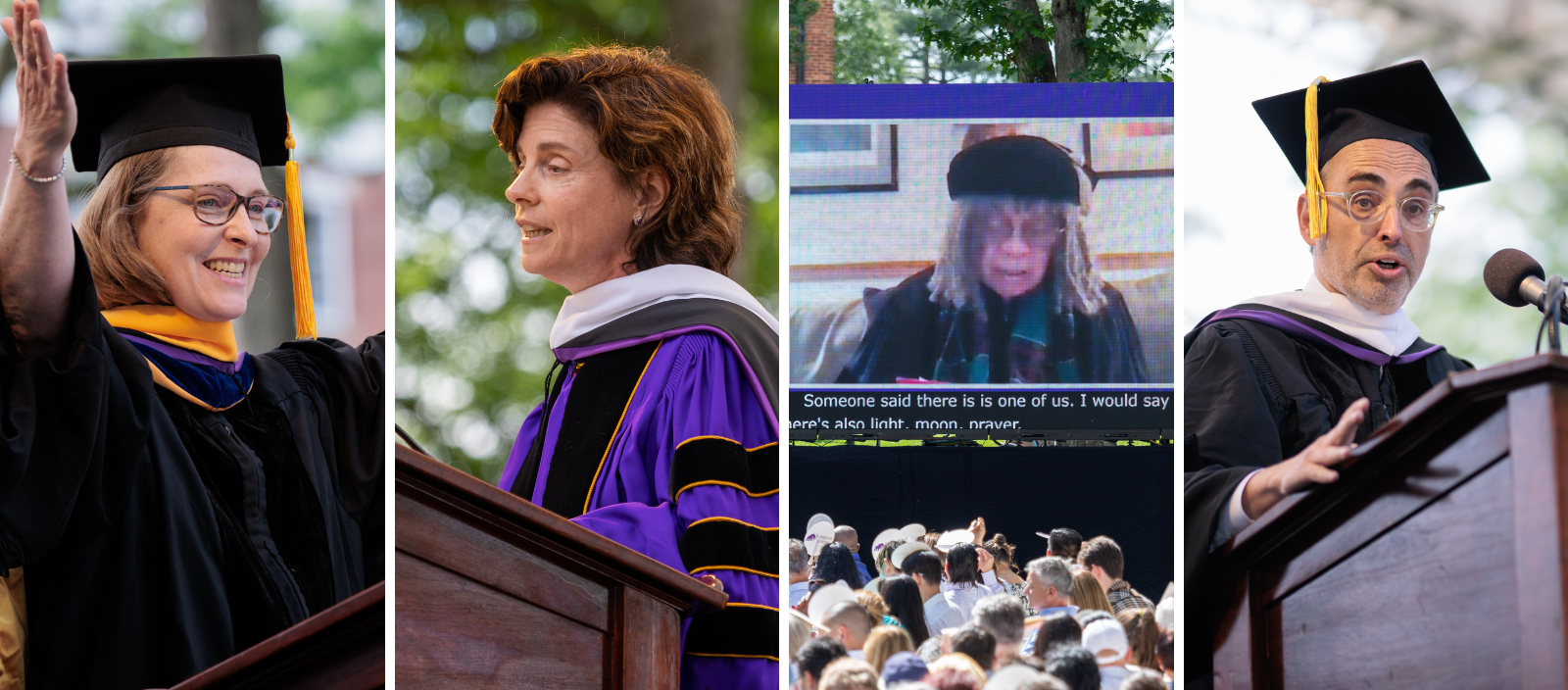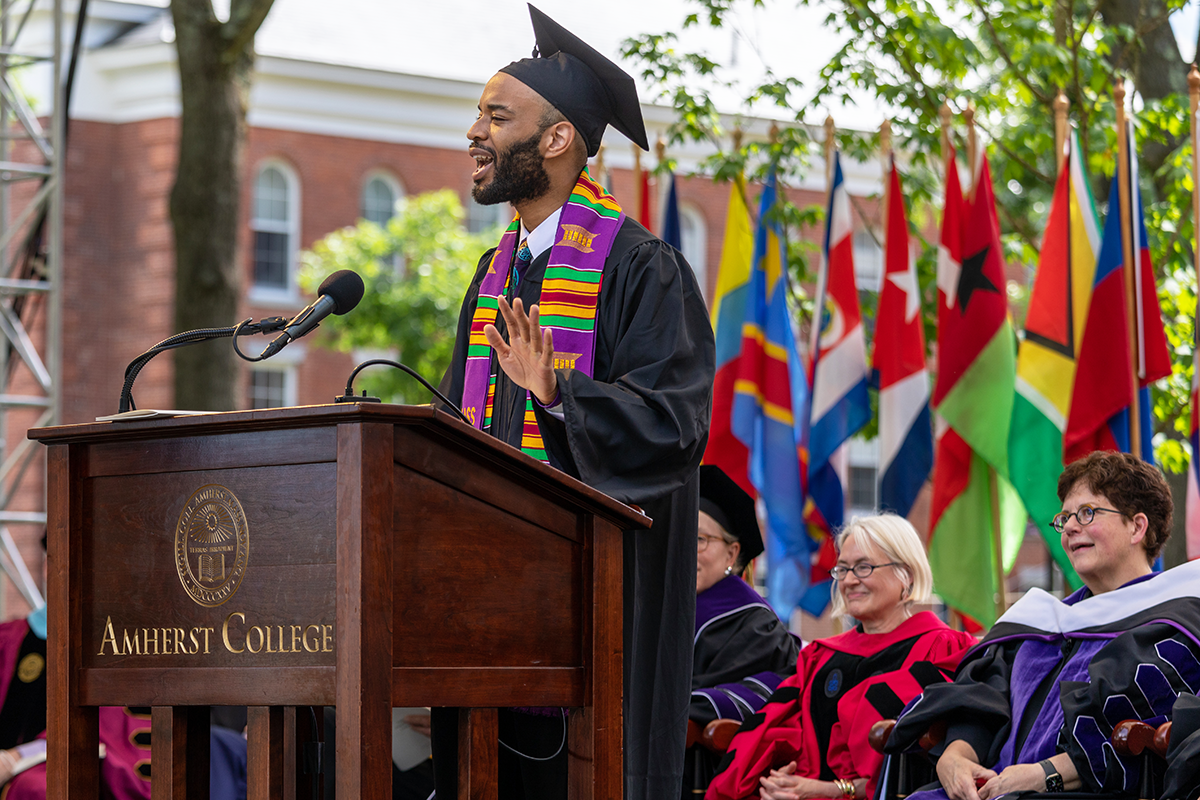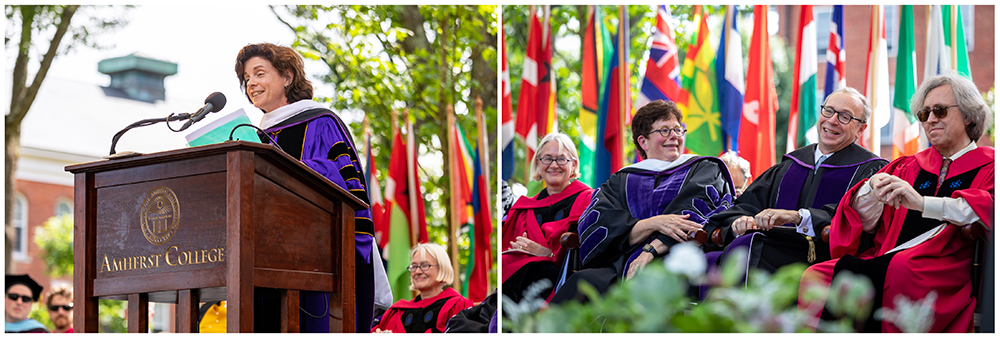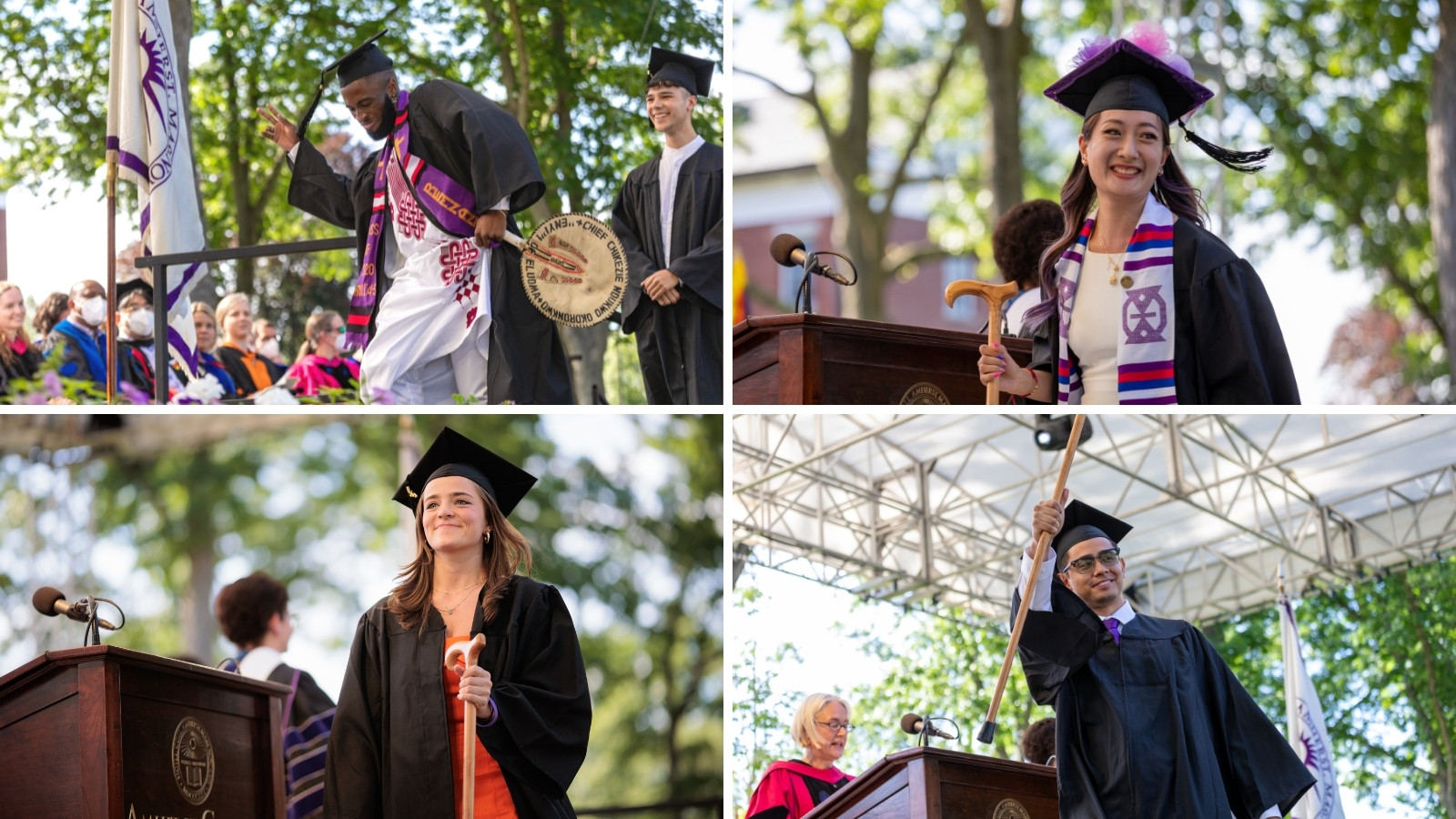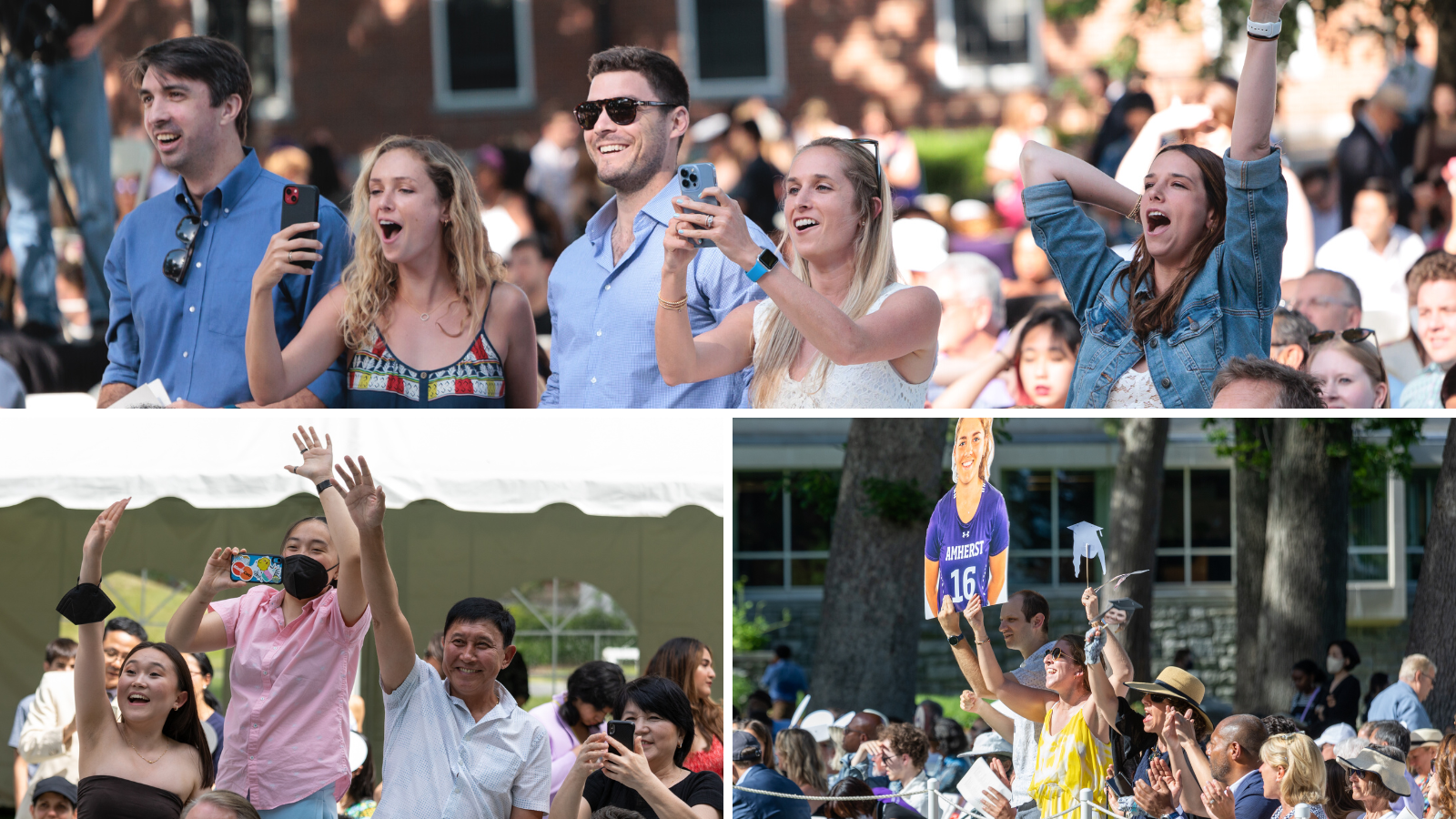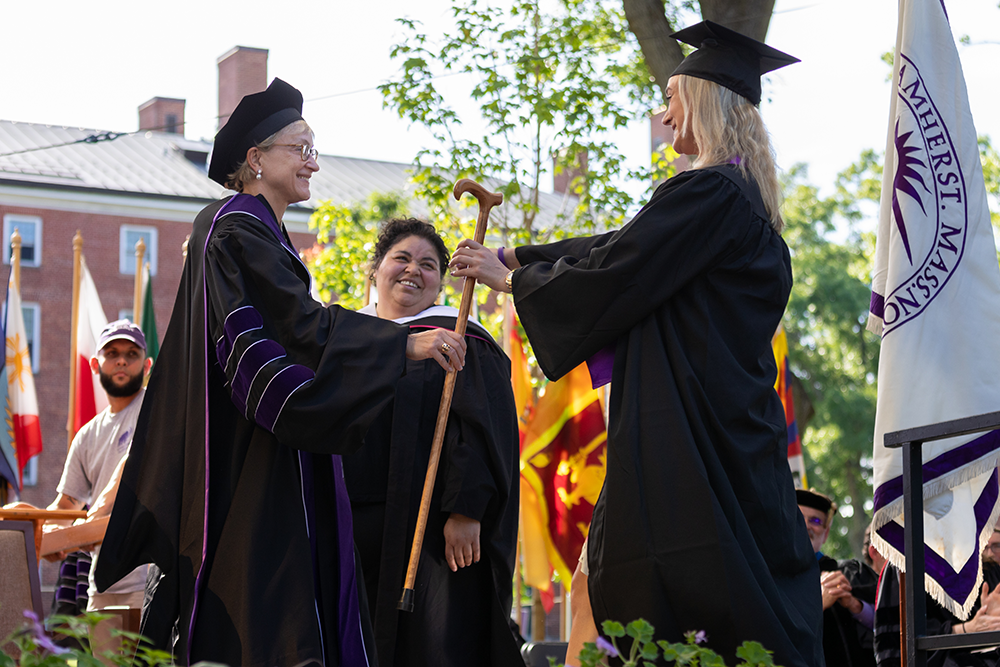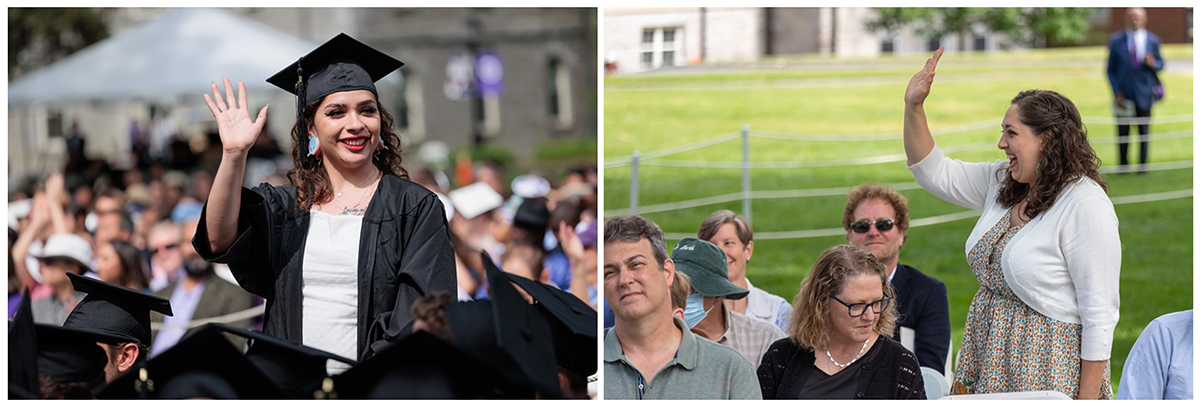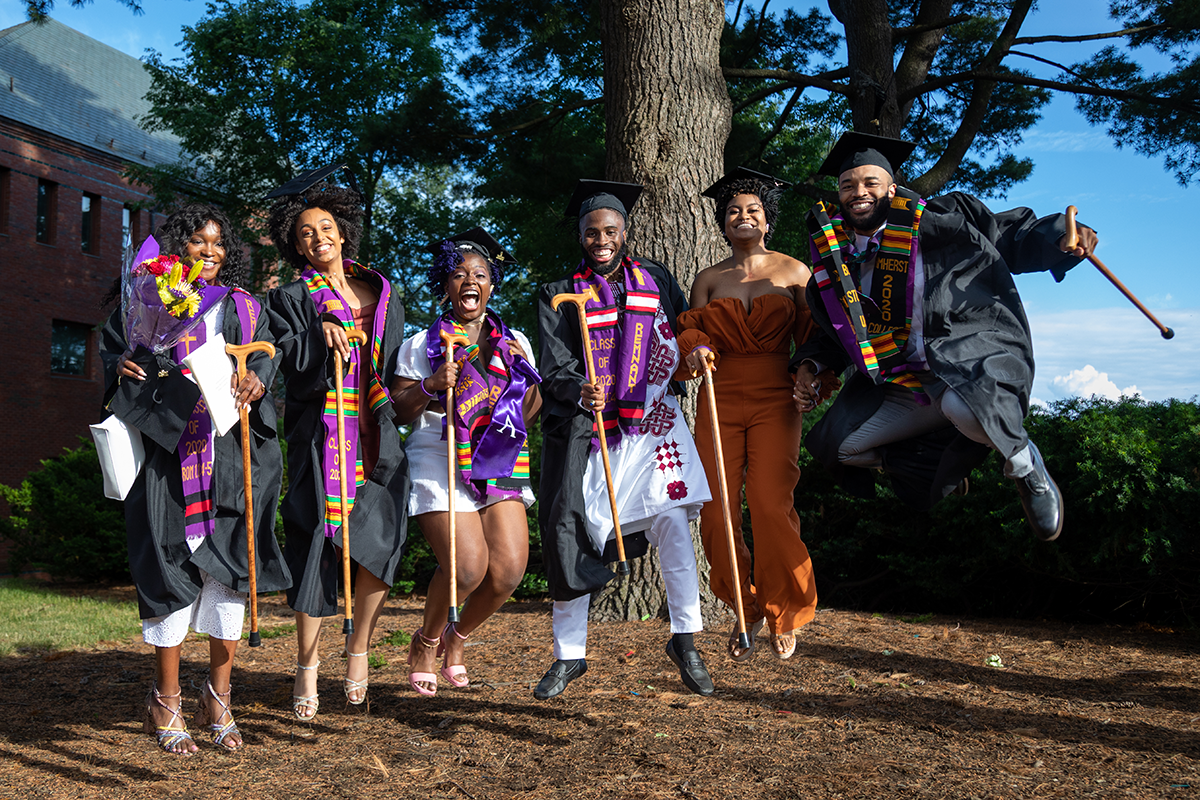‘We Grew in So Many Ways’
If there was a theme for the weekend, it was undoubtedly finding closure. Dunwell elaborated on this in his address, which began with him asking the graduates to consider why they came back to campus. He listed some possible reasons: nostalgia, the chance to reconnect with distant friends and “that coveted cane.” He said he came back to make his speech; and to have the opportunity to close the book on his Amherst experience in his own way.
Like many of his fellow graduates, Dunwell had initially expected to achieve some closure in 2020 by saying goodbye and hugging friends and members of the Amherst community in person, looking at his residence hall room one last time and bidding campus farewell on his own terms. But the pandemic “robbed” him and the graduates of the time to do such things, as well as the chance to celebrate their accomplishments together. Returning to the College and taking it all in, “not patting my pockets or checking around to see what I’ve forgotten, but realizing what I remember,” he said, would help him gain closure.
Student speaker Stanley Oscar Dunwell III ’20 addresses the class of 2020
“There’s joy, and some pride with closure,” he said. “Look at us now. We finished that chapter. We survived and graduated. We grew in so many ways.”
After noting that many in the audience didn’t have to answer the standard “what’s next?” question–since they are currently living the “next”–he again asked the graduates why they returned to their alma mater.
“Whatever person, what thing, what experience pulled you back here—I encourage you to hold on to it tight,” he concluded. “Let that propel you forward. Let the memories of Amherst College, both the good and the challenging, touch every fiber of your being. Let that ‘reason why’ allow you to learn more about yourself and inspire your decisions moving forward.”
Thanks But No Thanks, Williams
Following Dunwell’s speech, the College celebrated the year’s Phebe and Zephaniah Swift Moore Teaching Award winners, recognized life trustee Frank Austen ’50 with a Conway Cane and conferred honorary degrees on Dutton, Mandel, Sanchez and Shteyngart. Next up was Martin, who began her traditional address in a, well, less traditional way.
The last public speech Martin would make as president of Amherst began with a tongue-in-check rebuttal to a pardon archrival Williams College had granted her during the school’s Commencement on June 5. In remarks Mandel delivered that day while awarding Martin an honorary doctorate, Mandel officially forgave Martin for “historic crimes … committed by the institution over which she presides and for whose actions she is accountable under invented law.”
The “historic crimes” Mandel listed were a nod to the origin of Amherst in 1821 and the rivalry since then between Amherst and Williams: treason on the part of Amherst’s first president Zephaniah Swift Moore, who left Williams to found Amherst; kidnapping, also committed by Moore, of several professors and 15 Williams students who joined him in founding Amherst; theft of 650 volumes from the Williams Library, and copyright violation of the color purple that Williams has long used on athletics uniforms and in publications and official materials.
Maud S. Mandel, president of Williams College, attempting to grant President Biddy Martin clemency
But turnabout is fair play, it seems. During Amherst’s Commencement, Martin called Mandel to the podium to read the “grant of clemency” from Williams, and then proceeded to renounce it, citing the ruling in the 1915 Burdock v. United States U.S. Supreme Court case, which held that a pardon must be accepted in order to take effect. Martin therefore rejected Mandel’s pardon because, she said, “an acceptance is an implicit admission of guilt.”
She went on to counter three of the most egregious accusations leveled against her and Amherst. On the first count, Martin said Moore left Williams “on a most glorious and righteous steed with the intention of founding and establishing a superior institution in a more hospitable locale.” Given this, Moore’s departure did not represent treason. On the second count, because some Williams faculty members and 15 of Moore’s students “followed their beloved president in establishing the luminous and honorable college on the hill now much esteemed in academics and athletics,” Moore’s conduct did not represent a kidnapping.
And on the count of theft, the removal of books from the Williams Library was long ago disproven by that college’s own researchers, said Martin, and therefore, the $186,550 in overdue book charges calculated by Mandel and Williams administrators are without merit. Nevertheless, recognizing that the Williams Library “is apparently deficient in resources,” Martin impishly offered three books to Mandel: How to Stay Alive in the Woods, The Secret Life of Cows and Football for Kids: Learn the Basics & Play the Game.
She concluded by forgiving Mandel and the errors in the Williams pardon, noting that “we understand that the Amherst standard for accuracy cannot be obtained by every aspiring institution, particularly those having been deprived of the administrations of the Amherst faculty and those which may be chronically disposed to jealousy.”
‘The Best Class Ever’
With the Amherst-Williams historical record thus corrected, Martin then addressed the class of 2020 on a more serious note. She recounted how, on March 12, 2020, some of the members of that year's graduating class organized an impromptu “fauxmencement” ceremony on the Quad when they learned classes were to be held remotely for the remainder of the semester due to the COVID-19 pandemic. The College’s Choral Society performed at the gathering, and many dressed up for the occasion. Martin was invited to speak and, with some hesitation, she agreed to so.
Few students were wearing face masks or keeping six-plus feet distance from each other at the event, Martin recalled. “You were breaking the rules, but, even so, I loved your spirit,” she said. “I said to you–with tears in my eyes and I think plenty of them in yours as well–I wish this were not the departure.”
Martin urged the students that day to “stay well”; build stronger, more equitable instutions, specifically those related to healthcare; and work to end racism, antisemitism, homophobia, transphobia, misogyny and other forms of discrimination. She also told the students that she wished she didn’t have to make the decision to transition to remote learning and that the College would find a way to bring them back.
She ended her unscripted remarks that day by telling the then-undergraduates that, “by virtue of the authority vested in me by the trustees of Amherst College, I would declare you the greatest class ever–and I did on that day.” She added, triumphantly: “Again today, by virtue of all the authority invested in me by the trustees of Amherst College, I declare you the best class ever!”
Special Guests
This year’s honorary marshal Hope Eighmy Pascucci ’90 congratulates her daughter Anne Pascucci ’20
Maki Ybarra-Young nominated her high school teacher Sarabeth Morgan for a Swift Moore Teaching award
Educators L.E. Hartmann, an Advanced Placement United States history teacher from the Nightingale-Bamford School in New York; Matthew Laufer, an English teacher at the Francis W. Parker School in Chicago; and Sarabeth Morgan, a teacher in the Talented and Gifted program at Bonner Springs School District in Bonner Springs, Kan., were honored with the College’s Phebe and Zephaniah Swift Moore Teaching Awards. The prize, created in 1997 and named after the first president of Amherst and his wife, recognizes teachers who challenged, inspired and moved members of the graduating class. This year's winners were nominated by their respective former students (and members of the class of 2020) Megan Yang, Emma Swislow and Mikayla “Maki” Ybarra-Young.
No commencement is compete without the celebratory cap toss
